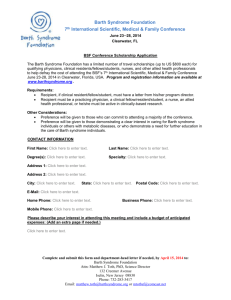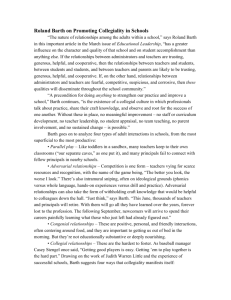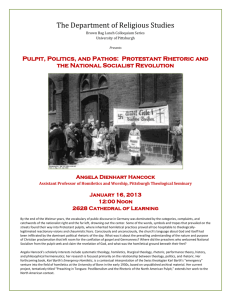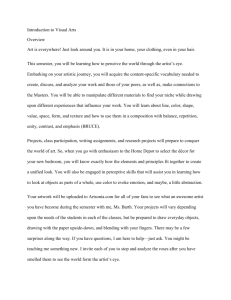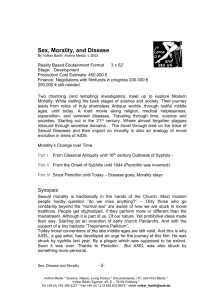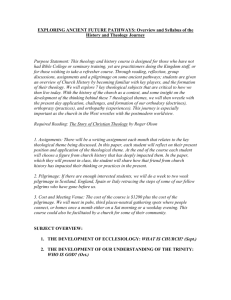LIBERTY UNIVERSITY A SELECT ISSUE IN CONTEMPORARY
advertisement
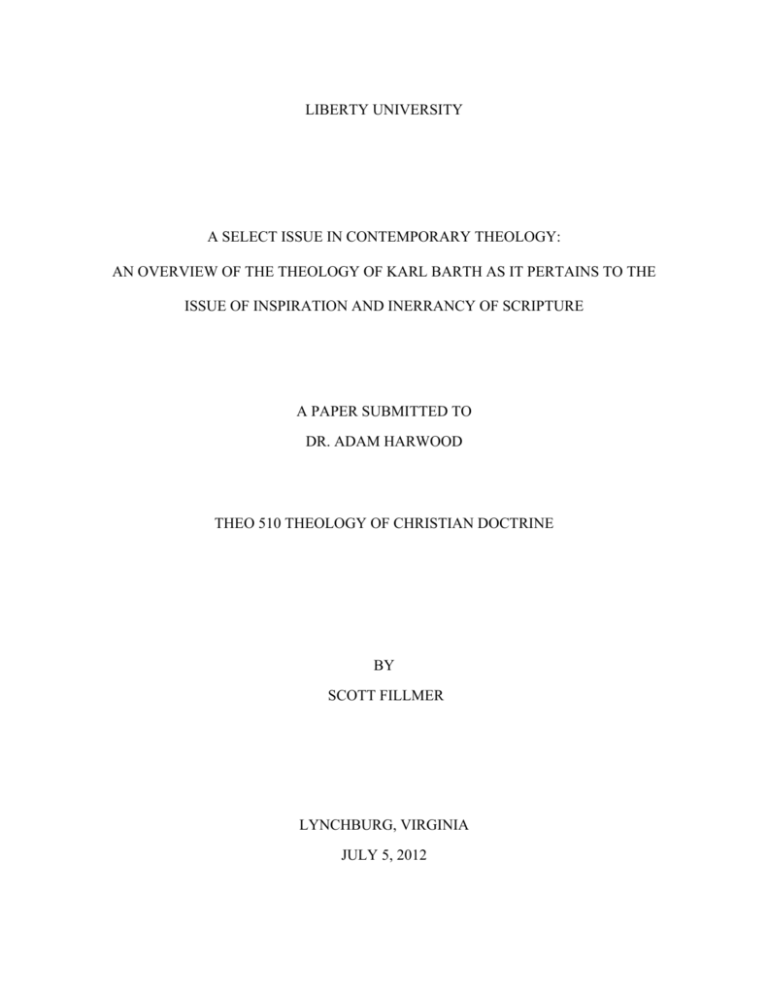
LIBERTY UNIVERSITY A SELECT ISSUE IN CONTEMPORARY THEOLOGY: AN OVERVIEW OF THE THEOLOGY OF KARL BARTH AS IT PERTAINS TO THE ISSUE OF INSPIRATION AND INERRANCY OF SCRIPTURE A PAPER SUBMITTED TO DR. ADAM HARWOOD THEO 510 THEOLOGY OF CHRISTIAN DOCTRINE BY SCOTT FILLMER LYNCHBURG, VIRGINIA JULY 5, 2012 TABLE OF CONTENTS I. Introduction ........................................................................................................................................3 II. Summary of Karl Barth and His Theological Background .................................................4 III. Inspiration Holy Scripture Examined.....................................................................................5 The Word of God Preached ........................................................................................................ 6 The Word of God Written........................................................................................................... 7 The Word of God Revealed ........................................................................................................ 8 IV. Evaluating Barth’s inspiration theology .................................................................................9 Summarizing Barth’s View on Inspiration ................................................................................. 9 The Importance of The Word of God as Inspired..................................................................... 10 V. Conclusion ....................................................................................................................................... 11 Bibliography ........................................................................................................................................ 13 2 I. INTRODUCTION Karl Barth, the Swiss theologian, is said by many to be one of the most influential thinkers of the 20th century, and one who carried a wide range of theological perspectives. Orthodox evangelicals have examined Karl Barth over the course of the last several decades, many of which have dismissed Barth and his theological views as liberal, and sometimes heretical. Although Barth did get his theological start in a very liberal environment, he quickly rejected the overall liberal theological views held by his educational institutions. Even though he generally rejected this liberal view, and took many of Calvin’s theological positions as well, Barth continued to maintain a few understandings, which evangelicals vehemently deny, such as inerrancy.1 The study presented here is important because of the significance of Karl Barth’s contribution to theological thought. To dismiss him in total due to some disagreements, though not unimportant ones, is to blind oneself to a great mind that was clearly gifted by God. To learn only from those with whom one agrees with the most is to be one sided in gaining knowledge and wisdom. To gain a better understanding from such a gifted follower of Christ, especially when one disagrees with their overall conclusions, will serve to deepen one’s knowledge in the true realities of Christ, the resurrection, and faith in general. This paper will examine inerrancy, the strongest theological disagreement, which exists between Karl Barth’s theology, and generally accepted orthodox views of evangelical thought.2 The purpose of this discussion is to 1 Paul Enns, The Moody Handbook of Theology, Revised and Expanded (Chicago, IL: Moody Publishers, 2008), 599-600. 2 Inerrancy is generally accepted as one of the non-negotiable aspects of evangelical theology. This is reiterated by Enns saying, “The foundational doctrine of evangelicalism is the inerrancy of Scripture as found, for example, in the doctrinal statement of the Evangelical Theological Society: ‘The Bible alone, and the Bible in its entirety, is the Word of God written and is therefore inerrant in the autographs.’” Enns, 648. The Evangelical Theological Society, ETS Constitution: Article II, Purpose, 2008, http://www.etsjets.org/about/constitution (accessed July 5, 2012). 3 show the importance of not rejecting Barth’s theological views in their entirety, even though there are strong differences between these two groups. II. SUMMARY OF KARL BARTH AND HIS THEOLOGICAL BACKGROUND While Barth started his theological training steeped in traditional liberalism from places like Tübingen, he also came to be a preacher serving a Reformed church where he “realized the shallow nature of the liberal message,” which was not an “authoritative word from God.”3 Serving as a pastor, he preached over 500 sermons, many of which were described as “truly evangelical” in nature, with a very high emphasis on prayer, and a high view of God’s sovereignty.4 Barth himself stated, “Prayer must be given the highest priority,” and that without prayer, “we cannot read and understand the Holy Scripture.”5 A turning point, theologically, came for Barth when he began to study Romans, when in 1919 he published his commentary stressing the importance of God over man.6 In his commentary, Barth also emphasized that he did not have all the answers, stating he “still [found] several passages hard to understand,” and admonished his reviewers not to “wholly dismiss or wholly accept” the theology contained within his commentary.7 As Barth further developed his theology he stressed, “Christian theology is good” when it is not an end in and of itself, but a “service in which one learns constantly.”8 Barth was learning and constantly perfecting his theology through the time when he wrote one of the longest books on systematic theology ever 3 4 99-106. Enns, 599. Charles M. Cameron, “Karl Barth the Preacher,” Evangelical Quarterly (Paternoster) 66, no. 2 (1994): 5 Karl Barth, Dogmatics, Vol. 1.2 (Edinburgh, 1956), 840, 755. Enns, 599. 7 Karl Barth, The Epistle to the Romans, 6th Edition (London, England: Oxford University Press, 1938), 12, 6 14. 8 Rolf Joachim Erler and Reiner Marquard, , A Karl Barth Reader, ed. Rolf Joachim Erler and Reiner Marquard (Edinburgh: Eerdmans Pub. Co., 1986), 16. 4 published called Church Dogmatics in “13 parts over four volumes, running more than 9,000 pages.”9 As Barth wrote this enormous theological treatise, which basically became his life’s work taking nearly 30 years to complete, he further developed his theological views, both liberal and reformed. Evangelicals can agree with his need to reject the liberal training he received in Germany early in his life, and in his desire to study the Bible “apart from liberal philosophy.”10 They would also agree with Barth’s emphasis on God’s “sovereignty and transcendence,” and his view on the “centrality of Christ” throughout Scripture.11 Contrasting those more conservative theological views, Barth was highly criticized in his day, and still is today. Evangelicals and others who take a more orthodox view of Christianity, criticize Barth for many different reasons, much of which can be traced back to a form of dualism in Barth’s theology.12 Barth denied “propositional truths” and higher criticism, and his views on election some to criticize his theology as leading “directly to universalism,” something very relevant to the 21st century theological debates.13 In addition to those issues, of great importance to Evangelical theology is Barth’s view on Scripture, denying inspiration and inerrancy outright. III. INSPIRATION OF HOLY SCRIPTURE EXAMINED Karl Barth’s views on Scripture were more complicated than to just say he denied inerrancy, as we understand it in our culture today. Barth’s overall work was based more in Christology than Biblical inspiration, and his theological writings and sermons pointed people 9 Wesley Wildman, "Karl Barth," in Boston Collaborative Encyclopedia of Theology, ed. Derek Michaud (Boston, MA: Boston University Modern Western Theology). 10 Enns, 601. 11 Ibid. 12 Wildman. 13 For a very recent look at the debate on universalism and how pastors are using this type of theology see Rob Bell, Loves Wins: A Book About Heaven, Hell, and the Fate of Every Person Who Ever Lived (New York, NY: Harper Collins Publishers, 2011). Enns, 601-602. 5 towards the work of Christ.14 To Barth, the Bible only becomes the “Word of God” when the “grace of God breaks through to the individual,” and at that point, the Word becomes God.15 His view of Scripture therefore, was to point people to Christ, the Word become flesh (John 1:14), not that the Bible was the Word. It should be pointed out that evangelicals use the terms “Word of God,” Bible, and Scripture as synonymous terms, where the “Word of God” is not equal in Barth’s view to an evangelical understanding of the terms Bible and Scripture. To Barth, the “Word of God” is Christ, but Scripture is not necessarily the “Word of God,” as will be shown below. In evangelical thought, inerrancy states Scripture is infallible, and “when all the facts become known, they will demonstrate that the Bible in its original autographs and correctly interpreted is entirely true and never false in all it affirms.”16 For Barth, he interpretes infallibility as a term equal to that of the “infallible” pope, and therefore rejected it as a fallible concept.17 Even so, Scripture was not at all unimportant to Barth. He dealt with the doctrine of inspiration in Dogmatics right at the beginning of his monstrous work, in a very long chapter on the Holy Scripture. This section is found in the second half of the first volume, under a larger subheading called “The Word of God in its Threefold Form,” which discusses the Bible in three parts; the “Word of God Preached,” the “Word of God Written,” and the “Word of God Revealed.” Then Barth concludes with a section entitled “The Unity of the Word of God.”18 The Word of God Preached The Word of God preached is the “proclamation of the Word,” which can break through 14 G.W. Bromiley, “Karl Barth’s Doctrine of Inspiration,” Journal of the Transactions of the Victoria Institute 87 (1955): 66-80. 15 Enns, 600. 16 P. D. Feinberg, "Bible, Inerrancy and Infallibility of," in Evangelical Dictionary of Theology, ed. Walter A. Elwell (Grand Rapids, MI: Baker Academic, 2009), 156-159. 17 Paul Enns, The Moody Handbook of Theology, Revised and Expanded (Chicago, IL: Moody Publishers, 2008), 600. 18 Karl Barth, Dogmatics, Vol. 1.2. 6 to the individual.19 Barth agreed with Feinberg in part on this point in that infallibility depended on man’s ability to “correctly interpret” the Scriptures, something Barth thought was unlikely. When the Word of God is preached, the obvious fallibility cannot be “rooted out unequivocally and definitively,” and is only the “miracle of revelation and faith when the misunderstanding does not constantly recur.”20 Barth recognizes, rightly so, that Scripture is easily misinterpreted, either out of ignorance, or on purpose with a point or agenda to be made. As Barth explains, “human talk, with its motives, and themes and the judgments among which it stands as human talk, is there, even while God’s Word is there.”21 Though the process is not made perfect through man, it can be made perfect in Christ, removing man’s ability to misuse the Word through preaching, or proclamation as Barth explains. This, Barth says is the “real proclamation in which talk is not set aside but exalted,” and this is the Word of God.22 Barth ends this section with a long essay from Adolf Harnack, showing his major objections to the underlying doctrines of the Catholic Church, comparing the infallibility of the Bible to the infallibility to the Pope.23 The Word of God Written The Word of God written is the revelation given by God to man, but because it is written by fallible man, it cannot be considered to be the “Word of God,” that is God Himself.24 Barth begins this section by trying to prove his point by completing an exegetical work on the written Word and how it pertains to revelation. He does so in pursuit of an “Evangelical and Reformed exegesis of the reality of the church,” through 2 Timothy 3:14-17 and 2 Peter 1:19-21.25 This is 19 Enns, 600. Karl Barth, Dogmatics, Vol 1.2.1. 21 Karl Barth, Dogmatics, Vol 1.2.1. 22 Ibid. 23 Adolf Harnack, Christus praesens - Vicarius Christi (Berichie der preuss, 1927), 415. 24 Enns, 600. 25 Karl Barth, Dogmatics, Vol 1.2.2 20 7 done to show inspiration is “not as a state of being, but as an act of the Holy Spirit.”26 Though Barth does not completely shift away from a subjective view, “there seems to be a regrettable hesitancy to accept the objectivity of the initial work of the Spirit.”27 While this may be a turning point away from Barth for reformed thinkers, Barth goes through a lengthy argument to conclude that the Bible is “God’s Word, and therefore cannot be controlled by us.”28 He insists Scripture is “in and through the text, the actual words of the text, [where] God speaks” to us, even though he dislikes the idea of human infallibility.29 Perhaps most important to modern day evangelical thought, Barth “recognizes the danger of subjectivity as though the Bible is only the Word of God as we experience or believe it to be such,” something the 21st century has embraced in relativism. Barth even appeals to Calvin “to show other factors are only secondary to the divine self-attestation” of Scripture.30 The Word of God Revealed The Word of God revealed is “God revealing Himself by speaking to the apostles and prophets.”31 Barth begins this section to explain how God’s Word, when read and understood, witnesses to past revelation. Described as a witness, the Word now is a means to look beyond self and on to another. This witness is then said to vouch for the truth in the other person, and this is the service the prophet and apostle serves to the Word.32 This all sounds fine up to this point, but as Barth goes through this discussion on the service of witnesses, he asks, “why and in what respect does this Biblical witness have 26 Bromiley, 74. Bromiley, 74. 28 Karl Barth, Dogmatics, Vol 1.2.4. 29 Bromiley, 77. 30 Bromiley, 79. 31 Enns, 600. 32 Karl Barth, Dogmatics, Vol 1.2.4. 27 8 authority?”33 Revelation, which comes from the prophets and apostles, is dependant on two groups, the writers, and the readers. The reader “cannot understand the Bible” apart from the work of the Holy Spirit, and the “writer cannot proclaim Christ apart from the work of the Spirit.”34 As Barth moves ahead he makes the point clearly that he rejects “general revelation in nature,” saying only Christ can reveal God to man in the coming Word of God.35 Barth does believe revelation continues today in this “coming of the Word of God,” but “rules out” any form of progressive revelation.36 IV. EVALUATING BARTH’S INSPIRATION THEOLOGY Summarizing Barth’s View on Inspiration Barth in general did not agree with coming to conclusions using propositional truths taken from Scripture. This stems from his understanding of inspiration and inerrancy of Scripture. For the culture today, especially for those just discovering Barth’s theology, this could validate an understanding of relativism and universalism that has gained momentum in the 21st century. Many of Barth’s other theological views can be understood, and reasoned with, when examining his views on inerrancy and inspiration. For example, it stands to reason Barth would reject stating propositional truths using Scripture if he did not believe it was the inerrant word of God. But overall, Barth “rejected religious language as inerrant truth [even though] without a doubt biblical data supported inerrant, divine communication to man by way of human language.”37 33 Ibid. Bromiley, 76. 35 Enns, 600. 36 Ibid. 37 Jack Barensten, "The Validity of Human Language: A Vehicle for Divine Truth," Grace Theological Journal (Grace Seminary) 9, no. 1 (1988): 43. 34 9 Barth’s view on Biblical inerrancy could very well have been a product of his early liberal training, but his final theological view on inerrancy can be summarized saying: Karl Barth was not a fundamentalist who believed that the Bible was the actual word of God and that every word of the Bible was “true.” Instead, he saw the Bible as a human book, written by people with human failings. But he did believe that the Bible was the source of revelation and the place where people may meet God, because God has chosen to meet them there.38 This clearly show’s Barth’s view of inerrancy, but to evaluate a theologian’s life work on one such statement would be unfair to his theology in total. The statement above could have been written in summary of countless theology students and Christians today. Yet this is still an exit point for many reformed evangelicals in our culture, which will subsequently reject Barth in total on this one point. The Importance of The Word of God as Inspired From an evangelical perspective, why is Barth’s view on inspiration and inerrancy such a difficult point of contention today? There are many reasons why inerrancy is important, especially today, when we live in a pluralistic society that is intent on defining truth as whatever it makes it out to be. From a scholarly viewpoint, there are theological, historical, and epistemological reasons for inerrancy. From a theological point of view, Paul, the disciples, and Jesus among other people, all called on the authority of Scripture. Jesus quoted Scripture throughout his ministry and took the view that Scripture was the inspired Word of God. If God inspires the work, and God is all-powerful, all knowing, and completely Holy, He certainly could influence the final canon to be completed accurately. If the Bible were not accurate, our own view of inspiration, among many other theologies that come from the Bible, would not be accurate either. In other words, without inerrancy, much of what we believe in Scripture could 38 Karl Barth Foundation, Theology of Karl Barth, Karl Barth Foundation, March 2012, http://kbarth.org/theology/ (accessed June 18, 2012). 10 not be held out as truth either. Historically, the early church long held to the inerrancy, dependability, and authority of Scripture. History has a way of being tested by time, and to disregard the history of the church would itself be in error. The early Church had far fewer questions about the inerrancy of scripture. It was known to them to be true, and fully trustworthy. If we depart from inerrancy, we also must depart from many other doctrines formed by the early church. An epistemological view would state that some assertions in the Bible are at least potentially, independently verifiable. Viewed as a type of domino theory, if one falls, they all fall, if we hold certain propositions taught by the Bible to be true that are not, we cannot continue to hold any of the propositions taught by the Bible to be true. V. CONCLUSION Karl Barth’s views have critics from every aspect of modern day theology. He may be one of the most misunderstood theologians of recent history, especially when trying to examine his views in small sound bites as our culture is accustomed to doing today. His theology seems to be in a constant state of fluctuation through the learning process, making some of his points self-contradictory, and others a product of his time. A person should always be examined in light of their own period in history, something that can be seen in his views concerning women in Volume 4 of Dogmatics. It is easy to be quick to point out Barth’s flaws when it comes to inspiration and inerrancy, but his point of view of far more complex than a simple statement such as that. It took Barth over 250 pages to explain his reasons behind his threefold form of the Word of God, and both liberals and reformed thinkers can find points of contention within those pages. Barth has “clearly seen the weakness in the [liberal] historical approach to the Bible,” and the question 11 should be asked whether “Barth himself might now wish to modify his presentation of the doctrine. To judge from the recent trend of his writing, it seems certain that he [would].”39 While some of Barth’s theological points go against orthodox reformed views, and there are many, he should not be rejected in total. Theology, according to Barth, was not an end of itself, but something to continuously learn from. This means even Barth himself would likely conclude his own views needed further study, evaluation, and correction. Evangelical Christians should harmonize with Barth where they can, pointing out where he needs correction when appropriate, such as with Biblical inerrancy, in an attempt to follow after Barth in an attempt to continually learn what God has to teach us about His kingdom. 39 Bromiley, 81. 12 BIBLIOGRAPHY Barensten, Jack. "The Validity of Human Language: A Vehicle for Divine Truth." Grace Theological Journal (Grace Seminary) 9, no. 1 (1988): 21-45. Barth, Karl. Dogmatics. Vol. 1.2. Edinburgh, 1956. —. The Epistle to the Romans. 6th Edition. London, England: Oxford University Press, 1938. Bell, Rob. Loves Wins: A Book About Heaven, Hell, and the Fate of Every Person Who Ever Lived. New York, NY: Harper Collins Publishers, 2011. Bromiley, G.W. “Karl Barth’s Doctrine of Inspiration.” Journal of the Transactions of the Victoria Institute 87 (1955): 66-80. Calvin, John. Institutes of the Christian Religion. 1st Edition. Translated by Henry Beveridge. Peabody, MA: Hendrickson Publishers, 2008. Cameron, Charles M. “Karl Barth the Preacher.” Evangelical Quarterly (Paternoster) 66, no. 2 (1994): 99-106. Enns, Paul. The Moody Handbook of Theology. Revised and Expanded. Chicago, IL: Moody Publishers, 2008. Erler, Rolf Joachim, and Reiner Marquard, . A Karl Barth Reader. Edinburgh: Eerdmans Pub. Co., 1986. Feinberg, P. D. "Bible, Inerrancy and Infallibility of." In Evangelical Dictionary of Theology, edited by Walter A. Elwell. Grand Rapids, MI: Baker Academic, 2009. Galli, Mark, and Ted Olsen. 131 Christians Everyone Should Know. Nashville, TN: Broadman & Holman Publishers, 2000. Geisler, Norman L., and William E. Nix. A General Introduction to the Bible. Revised and Expanded. Chicago, IL: Moody Press, 1996. Gibson, David. “The God of Promise: Christian Scripture as Covenantal Revelation .” Themelios (The Gospel Coalition) 29, no. 3 (Summer 2004): 27-36. Harnack, Adolf. Christus praesens - Vicarius Christi. Berichie der preuss, 1927. Holy Bible. Wheaton, IL: Crossway, 2001. Karl Barth Foundation. Theology of Karl Barth. Karl Barth Foundation. March 2012. http://kbarth.org/theology/ (accessed June 18, 2012). 13 McCormack, Bruce L. “The Barth Renaissance in America: An Opinion.” The Princeton Seminary Bulletin (Princeton Theological Seminary) 23, no. 3 (2002): 338-340. Muller, Richard A. “The Place and Importance of Karl Barth in the Twentieth Century: A Review Essay*.” Westminster Theological Journal (Westminster Theological Seminary) 50, no. 1 (1988): 126-156. Stanley, Andy, and Lane Jones. Communicating for a Change: Seven Keys to Irresistible Communication. 1st Edition. Sisters, OR: Multnomah Publishers, Inc., 2006. The Evangelical Theological Society. ETS Constitution: Article II, Purpose. 2008. http://www.etsjets.org/about/constitution (accessed July 5, 2012). Wildman, Wesley. "Karl Barth." In Boston Collaborative Encyclopedia of Theology, by Wesley Wildman, edited by Derek Michaud. Boston, MA: Boston University Modern Western Theology. Yount, William R. Created to Learn: A Christian Teacher's Introduction to Educational Psychology. 2nd Edition. Nashville, TN: B&H Academic, 2010. Zellweger, Barbara. Theology. Barbara Zellweger. 2012. http://kbarth.org/theology/ (accessed June 5, 2012). 14
